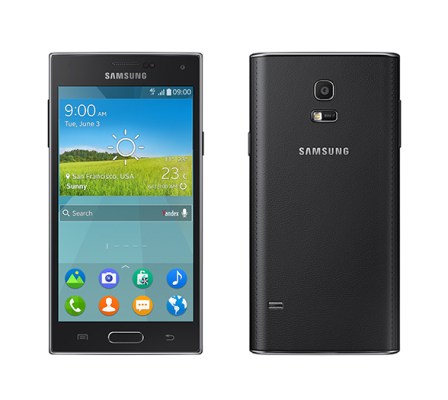Samsung is taking another baby step away from the Android platform today, with the announcement of the first commercial smartphone powered by the open source Tizen platform, instead of Google’s Android OS.
The hardware specs of the device offer little in the way of differentiation — albeit it does include a built-in fingerprint sensor, as the Galaxy S5 did — but the Samsung Z runs Tizen 2.2.1, making it a novel beast indeed.
It’s slated to ship in Q3, initially to Russia with a plan to expand it to other unnamed markets thereafter.
The Z will include access to a Tizen app store, which means buyers can expect a few thousand native apps. However the OpenMobile application compatibility layer will enable the handset to run Android apps too. And given how far ahead of the field Android is on app numbers then any challenger platform needs a line-in to the dominant ecosystem to stand any chance of gaining traction in the shadow of the Google-powered competition.
Samsung has of course been trying to drum up developer interest in Tizen for several years now — and plans to host local Tizen app challenges in Russia and CIS countries when it launches the Z. There’s also a Tizen Developer Conference kicking off in San Francisco tomorrow.
But all these developer efforts are inevitably going against the grain in a smartphone market dominated by the duopoly of Android and iOS. Developers develop for the largest, most lucrative markets, as you’d expect, which is why Microsoft’s Windows Phone platform has struggled to eke out any marketshare.
Today’s outing of the Samsung Z follows an update Samsung put out last week to its original Galaxy Gear smartwatch, to switch it from Android to Tizen. That brought the wearable in line with the Galaxy Gear 2 — which was Tizen from the get-go, rather than Android.
The world’s number one smartphone maker, which built its handset empire atop Google’s Android, has seen growth slowing in recent years as competition within the Android ecosystem continues to intensify. Ergo, there is a strategic imperative for Samsung to diversify its reliance on Android, and to try to build traction behind an open alternative that’s not led by Google.
It is of course fantastically unlikely that Tizen is going to grow to the point where it entirely replaces Android in Samsung’s portfolio. But the platform gives Samsung another string to its bow, and one that looks like it’s being deliberated tuned to stand out on power efficiency and consumption grounds, as a lightweight alternative to Android.
So while the Samsung Z may not look especially stand-out on paper, it will be interesting to see how well features such as an ‘ultra power saving mode’ go down with users — and indeed whether consumers can be convinced to eschew Android for the promise of a more efficient alternative. The pricing of the handset — which has not yet been announced — will also undoubtedly be key.
